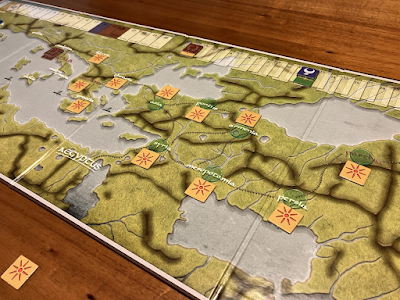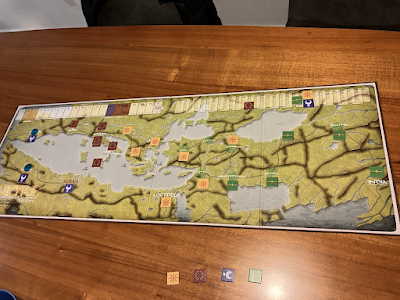As a break from painting I got out my copy of Phil Sabin's Empire to play a solo game. Empire is a light wargame set in the ancient era covering 200 years from the time of Alexander through to the demise of an independent Macedon. The map covers Iberia to India, with areas connected by land or sea. It starts with the Achaemenid Persians pre-eminent in the east, controlling eight areas, and Carthage (three areas) dwarfing the foundling Roman Republic (which has to meet consolidation conditions before it can begin to campaign) and Macedon, both of which control just one home area to begin with.
There is a revolt phase (die rolls to find which area throws off the yoke of its oppressor) then a campaign phase in which each of the four powers look to expand their territory or reassert control over territory lost. Three 'great captains' (you can probably guess who they are!) allow five campaigns on the turn(s) they are active instead of the usual single campaign per power.
There are two scoring rounds, turn 10 and turn 20. Carthage and Persian start with 12 VPs each; Rome and Macedon start with 0
We pick up the action in 350 BC.
350-341 BC. Bactria revolts. Carthage conquers Sicilia. Rome bickers with its Latin neighbours. The Persian Empire moves on Aegyptus but is defeated. Macedon conquers Graecia.
340-331 BC. Persia revolts. Alexander rampages through the east, taking Thracia, Asia, Pontus, Syria and Aegyptus. Rome continues to bicker. Persia takes back the province of Persia. Carthage fails to take Magna Graecia.
330-321 BC. Aegyptus revolts. Alexander continues his campaign, taking Armenia, Mesopotamia, Persia and Parthia. The Persians attempt a revolt in their home territory but fail. Carthage again fails to find a foothold in Magna Graecia. Rome is still embroiled in internecine conflicts.
320-311 BC. Macedon fails to take Bactria. The Parthians successfully reclaim their capital. Rome consolidates Italia and now has a presence in the Mediterannean. Carthage fails to make any headway in Magna Graecia.
 |
| Alexander's conquests and Parthia reclaimed for the green team. |
 |
| Carthage dominates the western sea as Rome emerges. |
310-301 BC. Pontus revolts. The Parthians fail to take Bactria. Rome fails to take Magna Graecia, and so fails Carthage. The Successor kingdoms reassert control of Pontus.
300-291 BC. Thracia revolts. The Parthians again fail to take Bactria. Carthage takes Magna Graecia; Rome promptly takes it off Carthage.
290-281 BC. Persia revolts. Carthage tries another futile expedition to Magna Graecia. The Successors fail to bring Aegyptus into their orbit. Parthia fails to take Bactria. Rome fails to take Cisalpina. Failure is epidemic!
280 - 271 BC. Macedon takes Thracia. Rome fails in an expedition to Sicilia, Parthia fails to take Bactria, and Carthage fails to take Magna Graecia.
270 - 261 BC. There is a revolt in Numidia. Rome takes Sicilia. Successors fail to take Aegyptus. Carthage fails to retake Numidia. Parthia takes Bactria at last.
260 - 251 BC. Thracia revolts. Carthage brings Numidia back into the fold. The Successors again fail to take Aegyptus. Rome fails to take Cisalpina.
 |
| Rome and Carthage with their spheres of influence (251 BC). |
 |
| Rome and Macedon (251 BC) |
 |
| The east (251 BC) |
This is now the first scoring round. Parthia controls Parthia and Bactria for 2 points, taking them to 14. Carthage controls Africa (2), Numidia, Iberia (2) for 5 points. This takes them to 17. Rome controls Italia (3), Magna Graecia, Sicilia for 5 points, giving them 5. Macedon controls Macedonia, Graecia, Asia, Pontus, Syria, Armenia, Mesopotamia for 7 points.
At this stage I thought that Rome looked to be in a strong position to push for a win in turn 20.
250-241 BC. Revolt in Graecia. Rome tries to attack Africa, unsuccessfully. Carthage attempts to take Sicilia but fails. Macedon takes Graecia again.Parthia fails to take Persian.
240-231 BC. Rome takes Cisalpina. Carthage fails to take Gallia. Greeks fail against Aegyptus; Parthians fail against Persia.
230-221. Revolt in Magna Graecia. Rome fails to retake it. Parthia fails to take India. Legacy Successors take Aegyptus. Carthage fails to take Gallia.
220-211 BC. Hannibal sweeps through Gallia, Cisalpina, Italia, bringing Rome to its knees. Macedon fails to take Thracia, Parthians succeed in taking Persia, Rome, forced to consolidate again, fails.
 |
| After Hannibal's devastating campaigns against Rome. |
210-201 BC. Revolt in Iberia. Scipio consolidates Rome and retakes Magna Graecia, but three other campaigns fail. Carthage fails to reclaim Iberia. Macedon takes Thracia. Parthia successfully conquers India.
200-191 BC. Pontus revolts. The Roman expansion continues: they take Cisalpina, Gallia, Iberia, Numidia, and just fail to take Africa. Parthia fails to take Mesopotamia. the Successors retake Pontus. Carthage reclaims Numidia.
 |
| The Roman revenge is swift, but they do not expand east into Greece. |
190-181 BC. Revolt in Syria. Carthage fails to take Iberia. Parthia fails against Mesopotamia. Successors take Syria and Rome fails to claim Sicilia.
180-171 BC. Revolt in Syria again. Parthia takes Mesopotamia. Carthage fails to take Iberia. Successors claim Syria. Rome takes Sicilia.
170-161 BC. Revolt in India. Macedon fails to take Illyria. Rome takes Numidia. Parthia fails to claim India. Carthage can't wrest back Numidia.
160-151 BC FINAL TURN: Revolt in Asia. Rome takes Africa. Carthage's attempt to revolt fails. Parthia is unsuccessful in India again and the Successors fail to take Asia.
Last turn scoring:
Rome: Italia (3) Magna Graecia, Sicilia, Africa (2), Numidia, Iberia (2), Gallia, Cisalpina for 12 points, taking them to 17.
Macedon: Macedonia, Graecia, Thracia, Aegyptus (2), Syria, Pontus, Armenia for 8 points, or 15 all up.
Carthage: no territories remaining, it rests on the 17 it had at turn 10.
Parthia: Parthia, Bactria, Persia, Mesopotamia for 4 points, taking them to 18.
 |
| Parthia takes the win with 18. 17 for Rome and Carthage and 15 for Macedon. |
Views of the board at game end.
 |
| Final positions. |
It was another interesting play of a Phil Sabin game, and surprisingly close. With two turns to go any of the four powers could have won mathmatically. By the last turn it was down to Carthage and Parthia, though I didn't know that until I tallied up the final score. If Carthage had held Africa on the final turn they would have taken the game.
Thoughts: Rome was fighting Carthage all game and never got a chance to expand east. Macedon could not hold Alexander's conquests, with vital revolts depriving it of a stronger result in the first scoring round. But it did manage to stay competitive. Carthage had a worthy fight with Rome and was only just short of victory. Parthia got back into the game with an early successful revolt against Macedon in its home area, and did just enough to take the win.
I wonder if Rome slightly underperforms in Empire. I don't recall a Roman victory in the times I've played it, and the need to risk a sea attack to get a foothold in Greece seems to result in a 'Carthage first' policy when an attack east earlier is probably necessary to achieve a win.
Good, thoughtful fun anyway, as is usual with Phil Sabin's designs.













